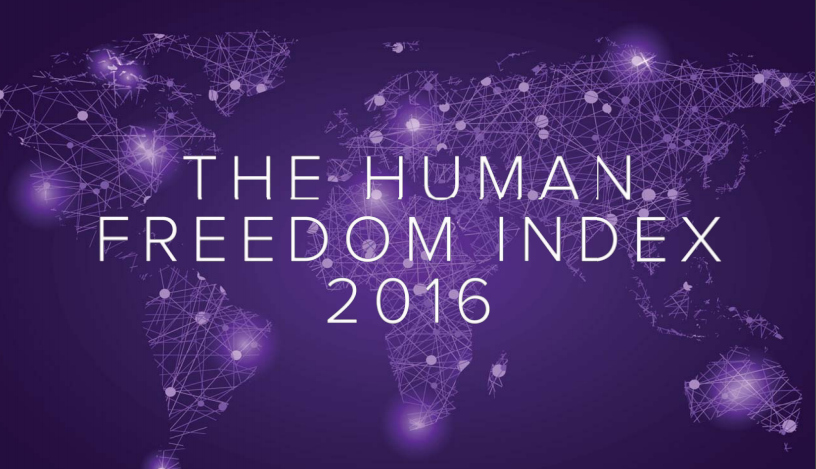Read full report: https://object.cato.org/sites/cato.org/files/human-freedom-index-files/human-freedom-index-2016.pdf
The top 10 jurisdictions in order are Hong Kong, Switzerland, New Zealand, Ireland, Denmark, Canada (ranked 6th), United Kingdom (6th), Australia (6th), Finland (9th), and the Netherlands (10th).
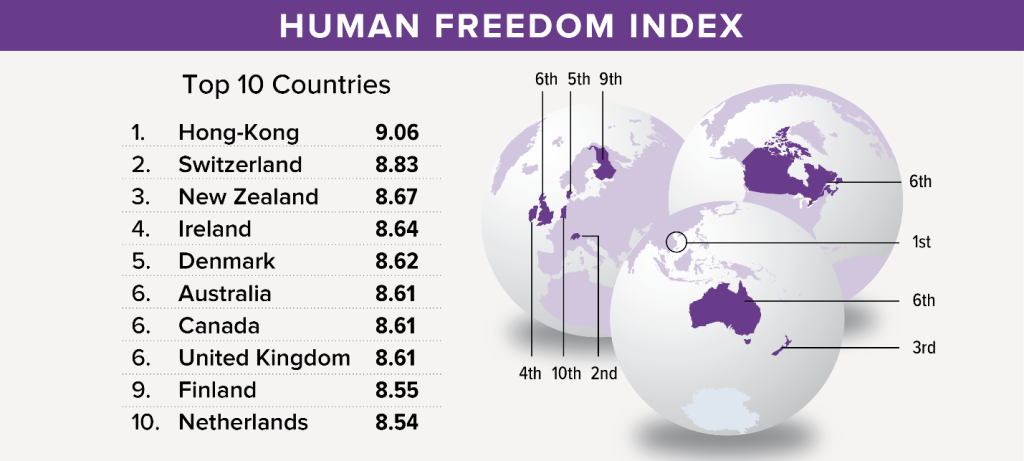 Other notable countries are Chile (29th), United States (23rd), Russia (115th), China (141st), Zimbabwe (148th), and Libya which comes in last.
Other notable countries are Chile (29th), United States (23rd), Russia (115th), China (141st), Zimbabwe (148th), and Libya which comes in last.
Among European countries, the most human freedom was observed in Switzerland, Ireland, the United Kingdom, Finland, and the Netherlands. On the other end, the least freedom enjoy citizens or Macedonia, Serbia, Moldova, Ukraine, and Russia.
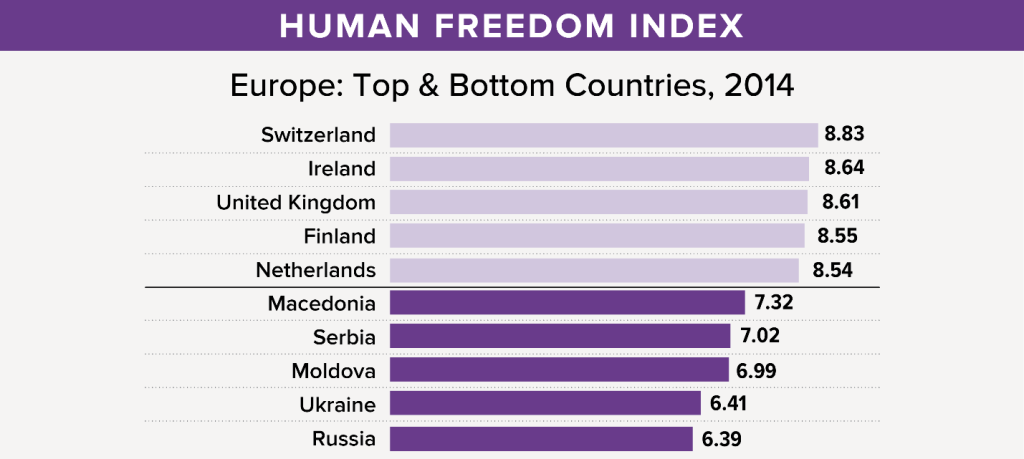 The Human Freedom Index (HFI) is the most comprehensive measure of freedom ever created for a large number of countries around the globe, ranking 159 countries based on 79 indicators of personal, civil, and economic freedom in the following areas: Rule of Law; Security and Safety; Movement; Religion; Association, Assembly, and Civil Society; Expression; Relationships; Size of Government; Legal System and Property Rights; Access to Sound Money; Freedom to Trade Internationally; Regulation of Credit, Labor, and Business. The Human Freedom Index 2016 is using data from 2008 to 2014, the most recent year for which sufficient data is available.
The Human Freedom Index (HFI) is the most comprehensive measure of freedom ever created for a large number of countries around the globe, ranking 159 countries based on 79 indicators of personal, civil, and economic freedom in the following areas: Rule of Law; Security and Safety; Movement; Religion; Association, Assembly, and Civil Society; Expression; Relationships; Size of Government; Legal System and Property Rights; Access to Sound Money; Freedom to Trade Internationally; Regulation of Credit, Labor, and Business. The Human Freedom Index 2016 is using data from 2008 to 2014, the most recent year for which sufficient data is available.
The index is co-published by the U.S.-based Cato Institute, the Fraser Institute in Canada, and the Liberales Institut at the Friedrich Naumann Foundation for Freedom in Germany.
The authors of the study—Ian Vasquez, Director of the Cato Institute’s Center for Global Liberty and Prosperity, and Tanja Porcnik, President of the Visio Institute based in Slovenia and a Cato Institute adjunct scholar—also measure the rule of law, which they consider “an essential condition of freedom that protects the individual from coercion.”
“The countries of Central Europe and the Baltics are moving apart from the rest of the Eastern Europe,” said Tanja Porcnik. “Out of 17 regions globally, it is the second-most improved in the index since 2013, with Slovenia contributing the most to the increase in human freedom. By contrast, Eastern Europe saw the second-most deterioration in human freedom, with Ukraine falling 27 places in the index. That country saw the most significant drop in human freedom in the region due largely to the military conflicts in eastern Ukraine and Crimea, which worsened the safety and security of Ukrainians and of journalists covering those conflicts,” said Porcnik.
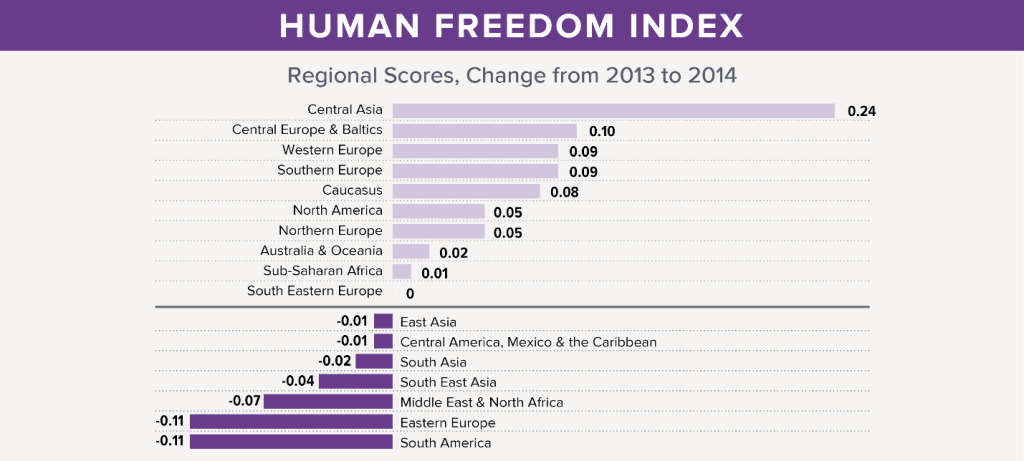 Countries that have high personal freedom tend to exhibit high economic freedom.
Countries that have high personal freedom tend to exhibit high economic freedom.
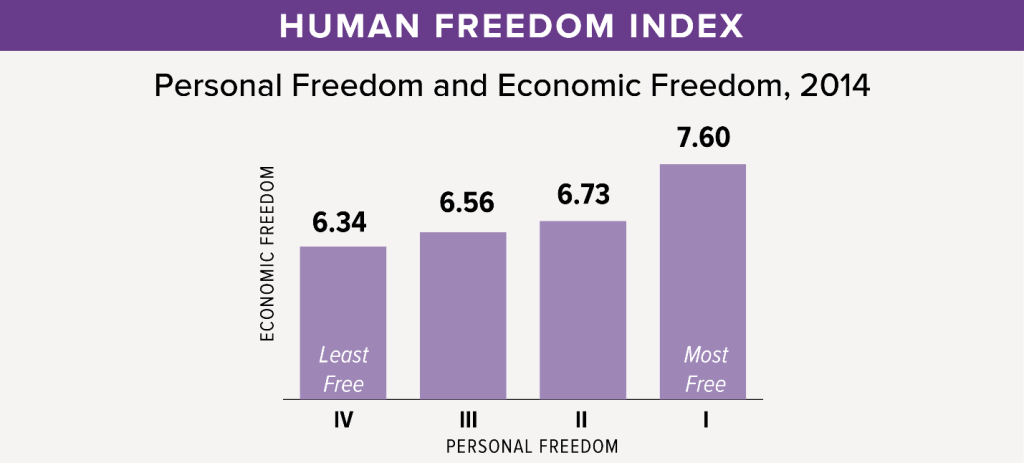 The freest countries in the world by quartile enjoy much greater income per person ($37,147) compared to the rest (the average income of the least-free quartile is ($8,700).
The freest countries in the world by quartile enjoy much greater income per person ($37,147) compared to the rest (the average income of the least-free quartile is ($8,700).
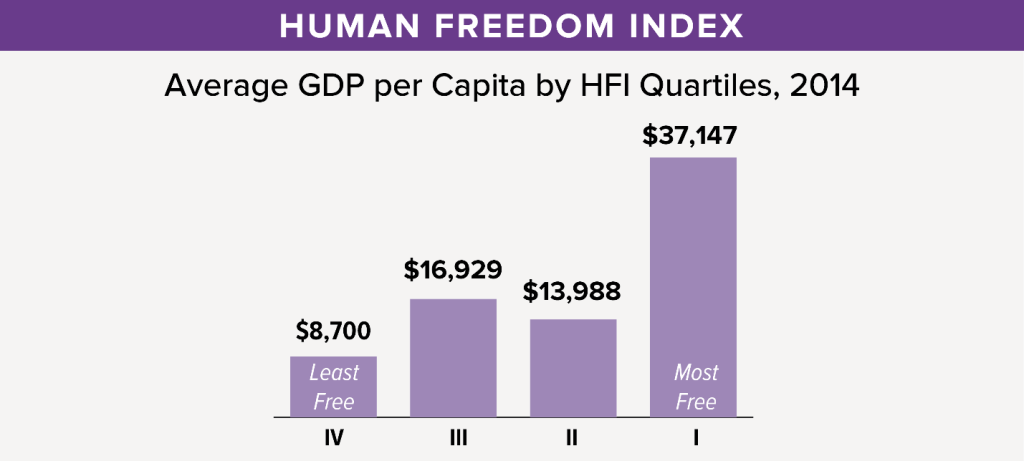 “As nationalism, authoritarianism, and populism strengthen in many countries around the world, it is becoming more important than ever to measure human freedom and the central role it plays in human progress,” said Vasquez. “The declining performance of the United States, once considered the bastion of liberty, is worrisome. We should all be concerned with the impact on liberty of the war on terror, the war on drugs, and the decline in the rule of law and economic liberty in the United States.”
“As nationalism, authoritarianism, and populism strengthen in many countries around the world, it is becoming more important than ever to measure human freedom and the central role it plays in human progress,” said Vasquez. “The declining performance of the United States, once considered the bastion of liberty, is worrisome. We should all be concerned with the impact on liberty of the war on terror, the war on drugs, and the decline in the rule of law and economic liberty in the United States.”
 The Human Freedom Index 2016 (REPORT & DATA) are available at www.cato.org/human-freedom-index
The Human Freedom Index 2016 (REPORT & DATA) are available at www.cato.org/human-freedom-index



